|
|
|
Sort Order |
|
|
|
Items / Page
|
|
|
|
|
|
|
| Srl | Item |
| 1 |
ID:
022857


|
|
|
|
|
| Publication |
Sept 2002.
|
| Description |
261-264
|
|
|
|
|
|
|
|
|
|
|
|
|
|
|
|
| 2 |
ID:
105939


|
|
|
|
|
| Publication |
2011.
|
| Summary/Abstract |
Global governance links security and finance in four important ways. First, the combined effect of the financial crisis and the global 'war on terror' has been an increasingly explicit merging of finance and security concerns. Second, security and finance were arguably closely linked in the rise of the modern form of government as far back as the late 17th century, a relation still evident in the form of 'government securities' such as bonds and treasuries, which in 2010 rose to new prominence in the various sovereign debt crises of the Eurozone. Third, a considerable literature has shown that finance and security share a claim to universal applicability in (all) other social spheres, resulting in various forms of financialization and securitization ( Martin, 2002; Langley, 2007; Buzan et al., 1998). Finally, not only have the liberal strategies of finance and security converged in a common vocabulary and epistemology of risk (management), but this technology of governing the future is currently undergoing a critical epistemic transformation that in turn implies finance and security in new relationships.
|
|
|
|
|
|
|
|
|
|
|
|
|
|
|
|
| 3 |
ID:
147956
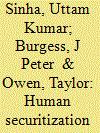

|
|
|
|
|
| Summary/Abstract |
In the large and growing literature on hydropolitics, insecurity generated through water-related conflicts is most often conceptualized under a model of economic resource scarcity. Conflict is generally reduced to the question of who has water, who needs water and thus what cost, in economic, political or military terms, is appropriate to acquiring access to water. This article argues that while such analyses effectively chart the central resource-strategic relations involved in the geopolitics of water, they nonetheless disregard the deeper biological and cultural (that is social, ethnic, religious) significance of water in any water conflict. Such analyses, it claims, are too strongly linked to the traditional (as opposed to human) security discourse and therefore run the risk of misdiagnosing the complexity of the water resource challenge. To respond to this challenge the article will develop a human security ‘metrics’ for analysing water-based conflicts in human security terms. It will then compare an analysis of the Indus Waters Treaty based upon the human security approach with an analysis based on a ‘traditional’ security assessment of the treaty in order to assess the viability of the two approaches. Finally, the article will link the comparative assessments back to the water wars literature, drawing conclusions about its strengths and weaknesses and the possibility of a synthesis of traditional and human security in the analysis of water conflict.
|
|
|
|
|
|
|
|
|
|
|
|
|
|
|
|
| 4 |
ID:
164288
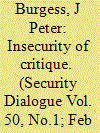

|
|
|
|
|
| Summary/Abstract |
‘Security’ is a uniquely rich object for critique. It rests on a long and noble conceptual history in Western thought. And yet the provision of security most often consists of a shoring up, through the discourses of nationality, ethnicity, political economy or even science, of what is assumed to be solid at its core but weakened through the contingencies of politics, society, ideology, and so on. The article argues that the critical force of critique stems from the fact that critique itself is a practice inescapably bound up with insecurity, and thus that the critique of security exercised since around 1997 as ‘critical security studies’ is self-replicating. By introducing concepts from Husserlian phenomenology, it attempts to show that insecurity is not a simple feature of an otherwise secure state of life, ripe for critical analysis that promises to expose its false premises. Rather, insecurity lies at the very foundation of critical thought. Building upon the bare and basic question, ‘What does it mean to mean?’, a phenomenology of security asks the straightforward question: ‘What is the security-ness of security?’ It permits one to ask what remains of security when all else is stripped away, what essential minimum must be retained in order for security to be security.
|
|
|
|
|
|
|
|
|
|
|
|
|
|
|
|
| 5 |
ID:
124773
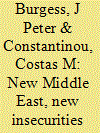

|
|
|
|
|
| Publication |
2013.
|
| Summary/Abstract |
The recent uprisings in the Middle East have highlighted - once again and in dramatic fashion - the confluence of understandings of security, representations of danger and practices of legitimation that shape our variegated geopolitical landscape. The political landscape of the Middle East is changing, and with it many of the rote certainties about how things are done or ought to be done in and with the region. Local regimes of power can no longer justify to national constituencies and international audiences the necessity of autocratic rule, states of emergency and suspension of rights. 'The West' confronts the hypocrisies and moral discounts of its own foreign policy choices, including how its definition of regional security supported the kinds of regimes, policies and human rights violations that Western states traditionally define themselves against.
|
|
|
|
|
|
|
|
|
|
|
|
|
|
|
|
| 6 |
ID:
087530
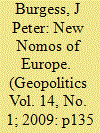

|
|
|
|
|
| Publication |
2009.
|
| Summary/Abstract |
According to Carl Schmitt, in his late work The Nomos of the Earth, published in 1950, the long evolution in the relation between humans and the earth has been decisive for the nature of traditional legal order. The historical links to European international jurisprudence (ius publicum Europaeum) have decayed with the old world order that supported them. Territoriality, once the foundation of the nation-state has evolved, causing a parallel change in the nation-state paradigm of sovereignty and the fabric of international law which has its basis in that paradigm. If Schmitt is correct in his prognoses about the end of a global era and the rise of a new yet uncharted world order in the mid-1940s, then the architects of the nascent European Coal and Steel Community face the same conditions, and must carry out their work with the same cultural, social and juridical raw materials, against the backdrop of the same concrete historical experience. This article will attempt to continue the trajectory of Schmitt's historical analysis of the ius publicum Europeaum, suggesting how its central concepts and theses map onto the grand geopolitical and civilisational project of European construction from 1950 to 2004 and beyond. It will explore the applicability of the concept of nomos for the nature of EU evolution, and interpret general elements of the European legal system in terms of the concept of nomos.
|
|
|
|
|
|
|
|
|
|
|
|
|
|
|
|
| 7 |
ID:
161635
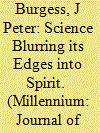

|
|
|
|
|
| Summary/Abstract |
Alexander Wendt’s 2015 Quantum Mind and Social Science is nothing if not true to its aims. Through rigorous argumentation and solid erudition it draws the logical lines from the state-of-the art of quantum theory to social reality. The result is a set of conclusions about the nature of social life that appear both plausible and convincing. And yet the voyage comes at a high price. For in order to reach its goal, Wendt’s reasoning blithely navigates around most traces of meaningful human experience or social relation that do not already hold social scientific currency. It avoids at some pains the deeply spiritual connections that have been made tenable by growing literature connecting Eastern religious thought and theoretical physics. It ignores any and all indices that might point to an explanation of the remaining quantum riddles through a rebooting of our ontological assumptions about quantum theory. Caught in a narrow understanding about question of being as the question of ‘which being’, Quantum Mind and Social Science thus misses the chance for truly insightful discovery about the nature of social relations.
|
|
|
|
|
|
|
|
|
|
|
|
|
|
|
|
| 8 |
ID:
091886


|
|
|
|
|
| Publication |
2009.
|
| Summary/Abstract |
In this article, I explore the relationship between 'value' and 'security' in the conceptualization of European construction and its transformation in recent years through the anti-terror effort. I suggest that the landscape of human values, and the way it is correlated with security, is discontinuous and fragmented. In the post-Madrid/London era, variations in cultures of law enforcement, border control, intelligence and diplomacy, and, not least, new cultures of fear and prudence, render this landscape increasingly complex. The value-laden nature of security and insecurity has contributed to a fragmented evolution in European approaches to the challenge of security. The politics of harmonization and standardization of European security reveals not a singularity in security, but the contrary, namely multiple securities. I thus develop a counter-argument to both realist and social constructivist understandings of values and the role these play in security thinking. I affirm, in a typical constructivist vein, that values matter in the formation of security policy. However, I reverse the typical constructivist position that sees security as the embodiment of ideas, arguing instead that the European self-understanding is itself the product of its own constellation of security and insecurity.
|
|
|
|
|
|
|
|
|
|
|
|
|
|
|
|
|
|
|
|
|